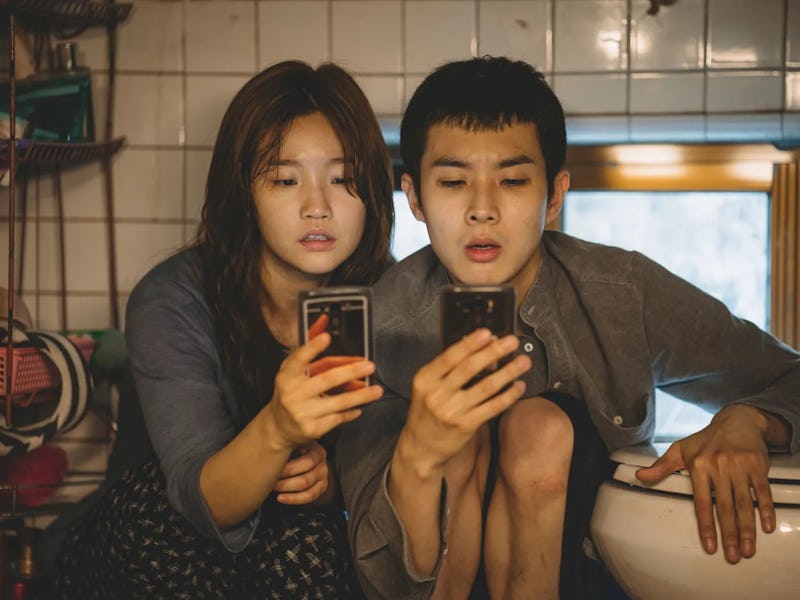The Greatest Contemporary Eat-the-Rich Thriller Still Hasn’t Been Topped
5 years later, Parasite is still unbeatable.

For the past few years, the big screen has begun to look increasingly like a dining room. Again and again, we've seen the have-nots sitting down to dine decadently on the haves. It's a trope that has been widely dubbed as "eat the rich."
Eat-the-rich dramas, comedies, and satires are cropping up everywhere we turn, from the sun-drenched class warfare of The White Lotus to the satirical fine dining horror in Mark Mylod's The Menu. But the first film to popularize this recent cinematic trend was Parasite, Bong Joon-ho's acclaimed 2019 black comedy. Not only was it one of the first modern works to take on the trope, it remains one of the only ones to actually do it well.
Parasite, which won the Palme d'Or at the Cannes Film Festival and became an instant cult classic upon its release five years ago, followed the Kims, an impoverished family living in a slum in South Korea's Seoul. They meet the wealthy Park family and, one by one, they trick the Parks into giving them work.
The basic premise of the film is, admittedly, akin to many of the other eat-the-rich dramas we've seen in recent years. Like Glass Onion, Saltburn, or the last season of You, Parasite presents us with an untenable social pecking order in which the wealthy and the poor exist at opposing extremes. However, Parasite brings a layer of nuance, a resounding amorality that is often lacking in other works that fit into this trope.
A standard eat-the-rich drama goes something like this: we meet a bunch of insufferable rich people – they are painted as laughable, two-dimensional caricatures who are ignorant of the inequality that surrounds them. As an audience, we laugh at them and their self-centered ways, before celebrating as the poorer, three-dimensional characters rise up and take them down. Grand justice! We all pat ourselves on the back for never liking those rich characters anyway and we go home.
More often than not, it's a trope that feels politically savvy and forward-thinking without ever daring to be really challenging. What systems are in place that allow these two extremes of wealth to exist? Why does it continue on and on? Why is wealth so hard to let go of once you've got it? Why, psychologically, do the wealthy become blinded to those around them? Who is in the right — or rather, is anyone in the right? It's also worth mentioning that many of the eat-the-rich works are brought to us from filmmakers who would most certainly be in the eaten rather than the eating class were they transposed into their own stories.
Parasite both humanized and condemned both families.
Where other eat-the-rich dramas are self-congratulatory, morally rigid, and, ultimately, a little flimsy in their world-view, Parasite goes further and deeper. Everyone in the film is painted in full color — the Parks, like the Kims, are fully realized characters. As the film goes on and the Kims latch onto the Parks, Park's film becomes murkier. We see, in real time, the insidious nature of greed – how it turns people ugly. After all, it is capitalism – a structure in which only a few can ever survive let alone thrive – that transforms the family into ever hungrier parasites.
In this eat-the-rich tale, it is not the wealthy people who are inherently bad — rather, it is wealth itself. "She's so naive and nice. She's rich, but she's still nice," says Ki-taek (Song Kang-ho), the patriarch of the Kim family, of "Madame," the wife of the Park family. His wife replies, "Not 'Rich but still nice.' Nice because she's rich, you know? Hell, if I had all this money, I'd be nice too!" It's very easy to caricaturize and mock the wealthy – it is less easy to expose the system that creates them.
After Parasite, we are left not with a self-satisfied glow after gloating at a few silly flamboyant villains, but with a somewhat more bitter taste in our mouths. While the film may, on the surface, appear to follow a similar pattern to the eat-the-rich dramas that followed its lead, five years later, it remains one of the few that inspires real thought and self-reflection rather than simply relishing in the feast.